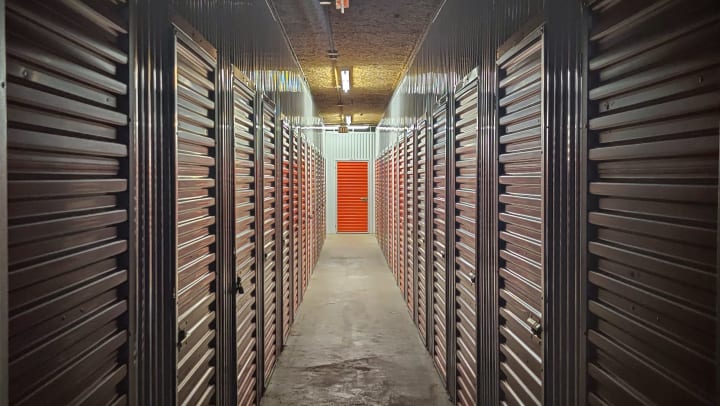Finding low-cost storage is possible, but you need to know what to look for. Storage facility rates fluctuate, and the rate you secure can also be affected by other factors (like signing up online vs. in person, as well as included amenities.) With self-storage facilities, a little knowledge goes a long way. Here’s how to find low-cost storage units, no matter where you are.
Check out BuxBear Storage!
First, we recommend you start your search for low-cost storage with BuxBear. If you're in our ever-growing service area, you'll see we've done everything possible to maximize amenities and minimize costs. Every BuxBear Storage location offers a modern design, electronically gated entry, and drive-up access to all ground-floor units. Regarding security, BuxBear Storage locations feature fully-secured perimeters and top-of-the-line security systems. On top of this, our on-site managers and friendly customer service teams have our clients' backs daily.
We do all this while maintaining some of the industry's most competitive rates for low-cost storage. Don't take our word for it. We invite you to check out our facilities for yourself. We've found a better way to do storage through more innovative design, placing a premium on safety and old-fashioned customer care.
Factors that can lower your storage unit price
Now that we've explained what we bring to the table, we'd like to give you a quick course on storage unit pricing. Every storage company has a different basic price range, but various factors can affect storage unit rental rates. If you know what goes into the price, you can find low-cost storage more easily.
Storage unit location affects price!
Self-storage prices vary from place to place, even among different locations owned by the same company. It's the same as any other type of property rental—high-demand areas, like busy parts of large cities, tend to be more expensive than less populated areas. You can usually find low-cost storage more quickly in less busy areas. This is especially worth doing if you don't need to visit your storage unit regularly, so a little bit of an added drive won't be too inconvenient.
Storage unit prices vary by season
As with booking hotels or plane tickets, certain types of the year see an increase in demand for storage units, which in turn affects rates. It's basic supply and demand. Usually, rates are higher in the summer. People move more often in the summer; college students leave home, and people clear out garage space to make room for things like kayaks and four-wheelers—you name it. As such, it's easier to lock in a low-cost storage rate in the off-season months.
Don't pay more for amenities you don't need
The quality of storage facilities varies, as do the included amenities, and everyone's needs are different. You may not need expensive alarm and surveillance systems, 24/7 on-site employees, climate control, etc., and all of those things will increase the base price of a unit. Look for packages that cover your needs, and avoid those with hidden fees and add-ons.
Look into automated self-storage facilities
It's becoming increasingly common for self-storage facilities to go all-remote and have no employees on site. Customers pay online or through a kiosk and have a passcode or app for when they need to access the site. Automated self-storage facilities can be very convenient, especially if you want 24/7 access to your unit since some facilities only let you access your unit during specific hours. Because unmanned storage facilities have less overhead, they usually charge less.
Seek out online discounts for self-storage
Many storage companies run occasional online promotions. Before booking in person, always look at the storage company's website to see if they're offering a discount. Some companies offer a discount simply for signing up online instead of doing it in person.
Use price comparison sites
Several websites let you compare storage unit rates in your area, similar to how you might look for the lowest hotel or travel rates. This is a good way of getting an overview of what's available in your area and average price ranges. It's important to note that storage unit comparison sites often have agreements with specific storage companies to list them in their results prominently, or they may not include some companies/locations at all. As such, we don't recommend using these sites as your only source of information.
Check out alternative storage platforms
Some online platforms for finding low-cost storage are different from traditional self-storage options. One example is Neighbor, which is similar to Airbnb for storage spaces. Neighbor allows people to rent out their spare space to others. This may include basements, attics, sheds—you name it. Sometimes, hosts offer up their storage space for very low prices.
However, as you might expect, storage this cheap comes with its own risks, and complaints abound. Other platforms are advertising unique strategies to offer lower-cost storage, too, such as picking your belongings up from your home, moving them to a storage site, and re-delivering them when you need them again. We believe traditional self-storage facilities offer a better mix of services for the price than alternatives, but everyone's needs are different, so you may find an out-of-the-box option near you that suits you.
Don't sacrifice quality!
Don't simply choose the lowest rate in your quest for low-cost storage. Make sure to weigh competitive pricing against the full package: included amenities, security features, customer service, etc. After all, if you opt for the cheapest unit on the market and everything gets stolen or damaged by inclement weather, that lower price doesn't do you any good. Or if that lower price comes with terrible customer service, you might find mystery charges on your bill or waste hours on hold trying to resolve problems. Do your homework, and look for modern, reliable service at a rate that suits your budget—like what BuxBear brings to the table—and you'll never go wrong.


